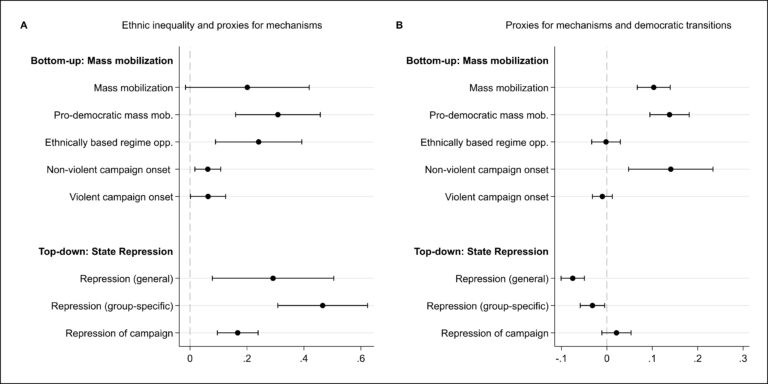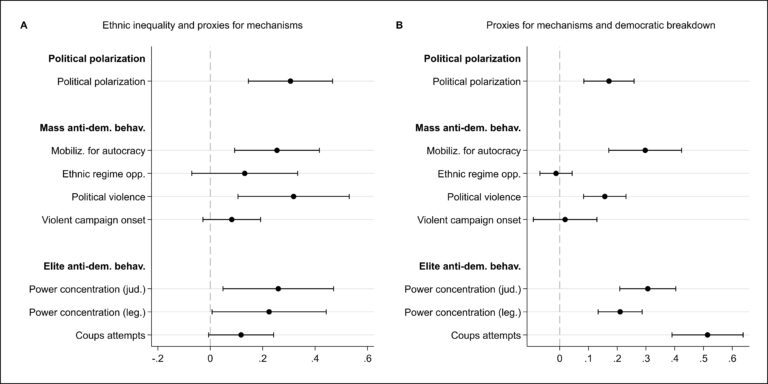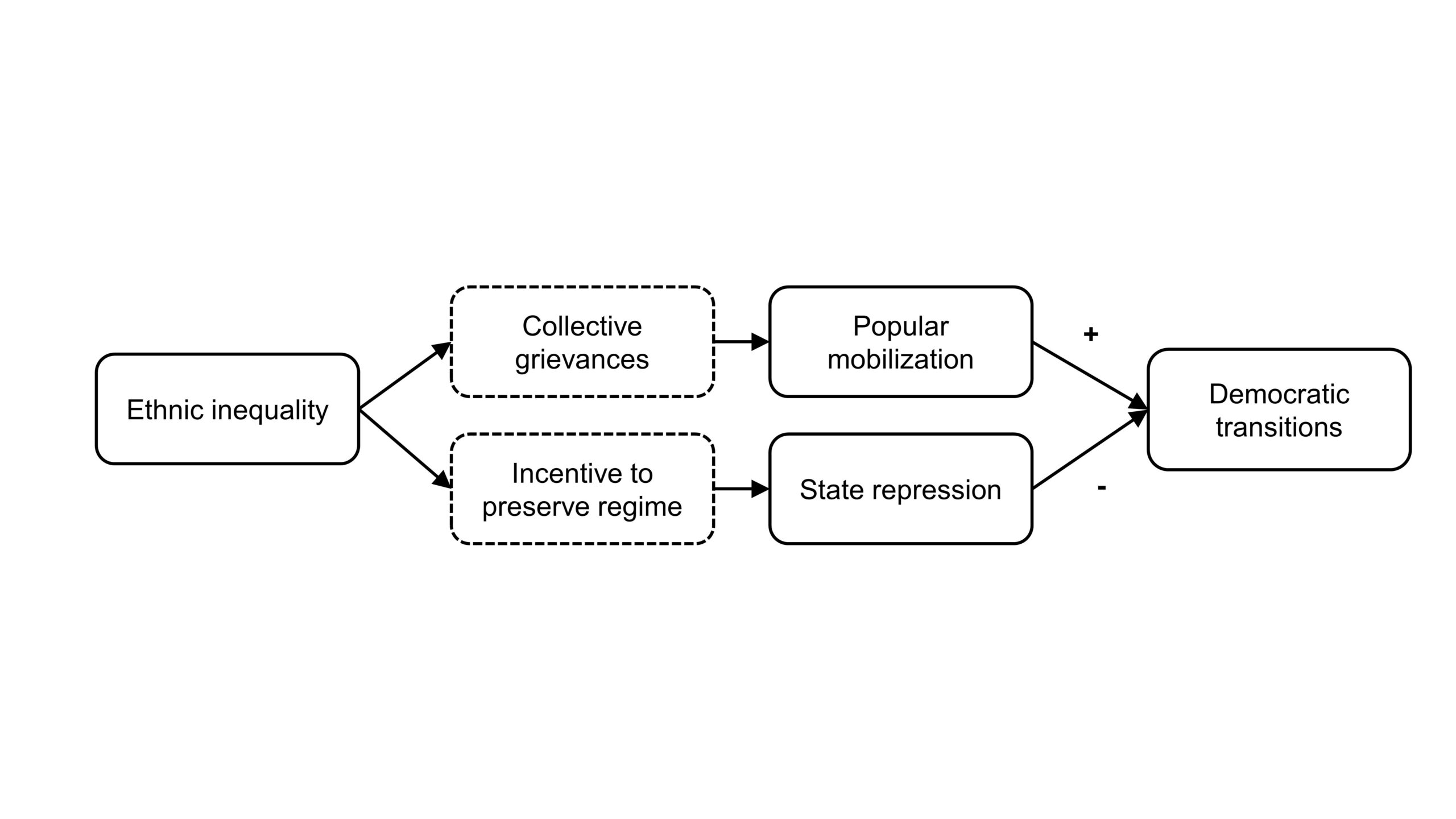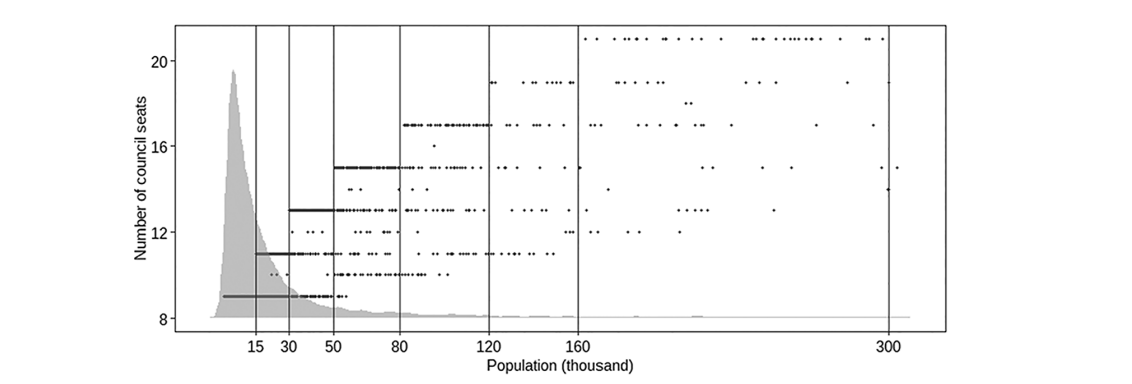Few social science relationships have generated as much interest as that between socioeconomic inequality and democracy. For example, recent discussions on the crisis of democracy frequently refer to economic inequality as detrimental to democracy. However, we have a relatively limited understanding of how ethnic inequality – that is, disparities in standards of living between ethnic groups affects the prospects for democracy. In my article, I ask whether and how socioeconomic disparities between ethnic groups influence the likelihood of a country to democratize and remain democratic.
Pressure From Below, Resistance from the Top
I argue that ethnic inequality does not affect the probability of democratic transitions due to two competing mechanisms. On the one hand, politically excluded and socioeconomically disadvantaged ethnic groups have much to gain from democracy and the potential gains from redistribution. On the other hand, an autocratic ruling coalition made up of members of the dominant ethnic group will be opposed to democratization. Fearing that disadvantaged groups will challenge their political and economic privileges through democratic means, they will repress any potential threats (see Figure 1). This dynamic can be illustrated with apartheid South Africa, which was characterized by deep inequalities, and where non-whites excluded from political power and denied the same acess to social services and the labor market that whites enjoyed. Grievances among the politically excluded and socioeconomically marginalized majority turned into various form of mobilization against apartheid. However, for a very long time, the regime acted in a highly repressive manner to suppress threats in the regime. Indeed, it was not until 1994 that all South Africans were free to vote.
How Ethnic Inequality Undermines Democracy
When shifting the focus from democratic transitions to democratic breakdowns, my theoretical expectations are more clear-cut: ethnic inequality is likely to represent a structural risk for democratic breakdown because it politicizes ethnic identities, induces polarization, and leads to conflict (see Figure 2). These dynamics can be illustrated with the political history of Fiji. Inequalities and resulting tensions between the indigenous Fijian community and the Indo-Fijian community, which had arrived under British colonial rule, led to political instability with coups in 1987 and 1999. These coups were led by extremist indigenous Fijians who feared that Indo-Fijians in government were becoming a challenge to privileges. In the same vein, Nepal’s democracy was severely destabilized by ethnic inequality after transitioning to democracy in the 1990’s. The continued exclusion of socioeconomically disadvantaged groups led to widespread perceptions that the democratic polity was illegitimate. Such collective grievances were exploited by the Maoist insurgency (1996-2006) as well as King Gyanendra, who dismissed the elected government in 2002.

Statistical Findings
To analyze the arguments, I rely on several cross-national measures that reflect socioeconomic ethnic inequality and democratic development. The results suggest that there is no relationship between ethnic inequality and the probability of democratic transition. Furthermore, an analysis of the proposed mechanisms shows that in autocracies, ethnic inequality is associated with increased prodemocratic mobilization as well as state repression (see Figure 3). This supports the argument that increased pressures for democracy are matched by an unwillingness among ruling elites to accommodate democratic demands and a readiness to respond with repression and violence. In contrast, I find that ethnic inequality increases the probability of democratic breakdown. A closer look at the mechanisms also suggests that ethnic inequality is associated with heightened polarization, political violence, coup attempts, and incumbent-led erosion of democratic institutions, which, in turn, predict a higher likelihood of reversal to dictatorship (see Figure 4).

Ethnic Inequality: “A Double Whammy“
The findings contribute to our understanding of the link between inequality and political regime change. When ethnic identity categories are clearly related to the distribution of resources, inequality is more likely to become socially and politically destabilizing. Indeed, when comparing inequality between ethnic groups with inequality between individuals, I only find that ethnic inequality is associated with democratic breakdowns. In short, we should pay particular attention to cases where ethnic categories and the distribution of resources coincide. The findings also echo classic theories of democratic stability, which emphasize the structure of social cleavages, arguing that democracy is less stable when social class and other identities coincide
Implications for Democratic Development
The study also has implications for understanding the factors that support democracy. Several ethnically unequal countries such as Peru, Fiji, Pakistan, and Bolivia have moved back and forth between dictatorship and democracy. The crucial challenge for these countries is not so much to establish, but to maintain democratic regimes. This also points to the broader observation, made by several prominent political scientists, that the factors associated with a transition to democracy (e.g., international pressure) are not necessarily the same as those that ensure the stability of democracy (e.g., economic development or ethnic inequality).

Notes
Figure 1: Theoretical argument: democratic transitions. Nontested assumptions are shown in dashed lines.
Figure 2: Nontested assumption is shown with a dashed line.
Figure 3: Ethnic inequality, mass mobilization, and repression in autocracies. A, Association between ethnic inequality and a series of theoretically expected outcomes for the autocratic subsample. B, Estimated association between the proxies and democratic transitions. Estimates based on fixed effects, controls for GDP per capita, and standard errors clustered on country. Point estimates with 95% confidence intervals.
Figure 4: In democracies, ethnic inequality is associated with variables capturing the theoretical mechanism. A, Association between ethnic inequality and a series of theoretically expected outcomes for the democratic subsample. B, Estimated association between the proxies and democratic breakdowns. Point estimates with 95% confidence intervals. Estimates rely on fixed effects, controls for GDP per capita, and standard errors clustered on country.
This blog piece is based on the forthcoming Journal of Politics article “Ethnic Inequality, Democratic Transitions, and Democratic Breakdowns: Investigating an Asymmetrical Relationship” by Lasse Egendal Leipziger.
The empirical analysis has been successfully replicated by the JOP and the replication files are available in the JOP Dataverse.
About the Author
Lasse Egendal Leipziger is an Assistant Professor of Political Science at Aarhus University. His research interests focus on the intersection of political regimes, inequality, and ethnic politics.


